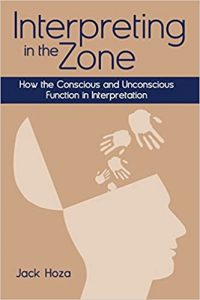
The following is taken from Chapter 5, Making Changes to one’s interpreting work, of Interpreting in the Zone: How the Conscious and Unconscious Function in Interpretation, by Jack Hoza
Aha! Moments
Great benefits can be had from having insights into one’s work, and such Aha! moments are essential to growth as an interpreter. People may experience an aha! moment when they get a sudden flash of insight in the shower after puzzling over a dilemma, or when they “sleep on it” and wake up in the morning with a keen awareness of what action to take. Most aha! moments do not just happen randomly, however. They arise from a desire to resolve a problem. So people need to first spend time thinking about the issue at the conscious level and, at the same time, let the unconscious work on possible solutions. Only after considerable thought and meaningful discussion with others can there be a sudden
flash of insight. Sometimes one needs to give the issue a rest and have a diversion, as with the shower example, because it can allow the uncon-scious to bring forth insight. In whatever way aha! moments arise, there are several steps that are needed for an aha! moment to happen.
Aha! Moments: A Three-Step Process
Csikszentmihalyil identifies the three steps toward achieving an aha! moment, using research that dates back to 1926. He labels the steps a period of preparation, a period of incubation, and insight or aha! moment—and has also proposed two other steps that are used for more complex issues. The three-step process appears in Figure 5.1.

…
Aha! Moments Require Thought and Experience
I once wrote the following about the need for interpreters to be reflective about their work: “Socrates had it right: ‘An unexamined life is not worth living.’ An interpreter who leads an unexamined life may not be worth hiring.” Given the nature of aha! moments, it is evident that those who are not paying attention to the important issues or goals in their lives are missing the period of the preparation stage, much less the other two stages. For interpreters to have the kinds of aha! moments that are needed for growth and change, they need to be reflective about their interpreting work and the decisions they make. They should think conscientiously about their work and decisions and talk to others who can help with processing issues that arise.